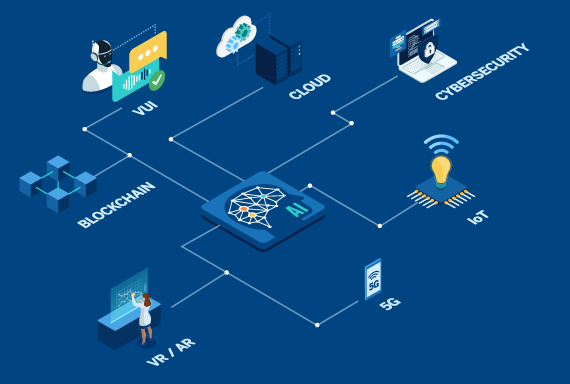In today’s fast-paced digital landscape, emerging technologies are not just shaping the future; they’re redefining it. From artificial intelligence (AI) to blockchain, these innovations are revolutionizing industries, transforming economies, and changing the way we live and work. Let’s delve into some of the most promising emerging tech trends and their potential impact:
- Artificial Intelligence (AI):
AI continues to be a driving force behind innovation across various sectors. From predictive analytics to natural language processing, AI-powered solutions are enhancing efficiency, productivity, and decision-making processes. Machine learning algorithms are becoming increasingly sophisticated, enabling personalized experiences, autonomous vehicles, and even breakthroughs in healthcare with precision medicine and diagnostics. - Blockchain Technology:
Blockchain technology, best known as the backbone of cryptocurrencies like Bitcoin, is now being adopted for a wide range of applications beyond finance. Its decentralized, immutable ledger system offers transparency, security, and trust in various industries, including supply chain management, healthcare, and voting systems. Smart contracts, powered by blockchain, automate and secure transactions, reducing costs and mitigating risks. - Internet of Things (IoT):
The Internet of Things (IoT) ecosystem continues to expand, connecting billions of devices worldwide. IoT devices collect and exchange data, enabling smarter cities, predictive maintenance in industries, and personalized consumer experiences. As IoT adoption grows, so do concerns about data privacy, security, and interoperability standards. - 5G Technology:
The rollout of 5G networks promises lightning-fast connectivity, enabling innovations such as augmented reality (AR), virtual reality (VR), and the widespread adoption of IoT devices. With lower latency and higher bandwidth, 5G will revolutionize industries like healthcare, manufacturing, and entertainment, unlocking new possibilities for real-time applications and remote services. - Edge Computing:
Edge computing brings data processing closer to the source of data generation, reducing latency and bandwidth usage. By processing data locally, at the edge of the network, edge computing enables real-time analytics, faster response times, and enhanced privacy for sensitive information. This technology is particularly crucial for applications requiring low latency, such as autonomous vehicles and industrial automation. - Quantum Computing:
Quantum computing holds the promise of solving complex problems that are currently intractable for classical computers. Leveraging quantum bits (qubits) and quantum phenomena, quantum computers can tackle optimization, cryptography, and simulation tasks at an unprecedented scale and speed. While still in its infancy, quantum computing has the potential to revolutionize fields like drug discovery, materials science, and cryptography. - Extended Reality (XR):
Extended Reality (XR), encompassing AR, VR, and mixed reality (MR), is blurring the lines between the physical and digital worlds. From immersive gaming experiences to virtual collaboration platforms and interactive training simulations, XR technologies are transforming how we learn, communicate, and interact with information.
These emerging technologies hold immense potential to shape the future of society, economy, and technology. However, with great power comes great responsibility. Ethical considerations, regulatory frameworks, and security measures must accompany their development and deployment to ensure that they serve humanity’s best interests and uphold fundamental values such as privacy, equity, and inclusivity. As we embark on this journey of technological innovation, let us harness these advancements to create a more prosperous, sustainable, and equitable future for all.


